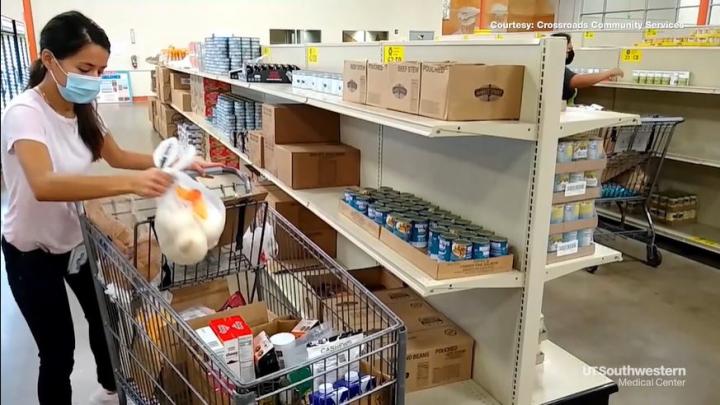
Credit: UT Southwestern Medical Center
DALLAS – April 21, 2021 – Food banks should be used more consistently rather than only during emergencies to better address food insecurity and related health issues, a joint study by researchers at UT Southwestern Medical Center and economists at the University of Dallas shows.
“The main discovery in our research is that encouraging clients and making it easier for clients to receive food frequently improves their food security, health, and well-being,” says Sandi Pruitt, Ph.D., associate professor of population and data sciences at UT Southwestern, and senior author of the study. “The food banking system is predicated on the assumption that people need food pantries for emergencies only. But this is a common misconception, as many families and individuals experience food insecurity for months or years at a time and it’s more of a chronic condition.”
The researchers calculated that a 10 percentage-point increase in the frequency of food pantry visits led to a 5.7 percent reduced likelihood of food insecurity and a 6.2 percent reduction in likelihood of poor health.
In 2018, 11.1 percent of U.S. households reported being food insecure, defined as inconsistent access to adequate food due to lack of financial or other resources, the researchers report. Food insecurity across the country has increased to new historical highs during the COVID-19 pandemic.
“Food insecurity rates often spike during an economic recession. Following the 2007-2009 recession, the nationwide food insecurity rate took 11 years to return to the pre-recession level,” says lead author Tammy Leonard, Ph.D., an economist at the University of Dallas. “This is an indication that we need to rethink our systems and processes for addressing this fundamental need.”
Researchers evaluated an innovative model used at Crossroads Community Services, a food pantry and distribution system located in southern Dallas County that focuses on nourishing families through nutritious food items to power dietary change for improved health. Crossroads partners with smaller community organizations to distribute food at multiple locations such as public housing facilities, churches, and community centers, and requires clients to pre-enroll for monthly pickups.
“What we observed in Dallas is that Crossroads has made food more accessible to clients and has also encouraged clients to come back regularly, and that signals that they should be seeking support. We hope that this can be a policy change in food distribution settings across the U.S.,” Pruitt says. “The food banking system and everything in the food assistance sector is more important than ever right now, and we really need to maximize the importance of these food assistance programs on clients to ensure that everyone has enough food to eat.”
###
The study, appearing in Applied Economic Perspectives and Policy, was supported by a Robert Wood Johnson Foundation Evidence for Action grant (73436). Leonard and David Andrews at the University of Dallas were co-authors.
About UT Southwestern Medical Center
UT Southwestern, one of the premier academic medical centers in the nation, integrates pioneering biomedical research with exceptional clinical care and education. The institution’s faculty has received six Nobel Prizes, and includes 23 members of the National Academy of Sciences, 17 members of the National Academy of Medicine, and 13 Howard Hughes Medical Institute Investigators. The full-time faculty of more than 2,800 is responsible for groundbreaking medical advances and is committed to translating science-driven research quickly to new clinical treatments. UT Southwestern physicians provide care in about 80 specialties to more than 105,000 hospitalized patients, nearly 370,000 emergency room cases, and oversee approximately 3 million outpatient visits a year.
Media Contact
UT Southwestern Medical Center
[email protected]




